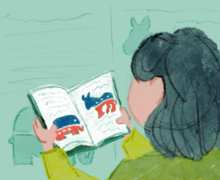LHM roundtable discusses issues impacting Hispanic, Latine communities
Leonardo Eriman | Contributing Photographer
Ricardo Nazario y Colón and Amanda Debose lead a discussion on the Latine identity and the challenges they face. The speakers used Marie Arana’s book “LatinoLand: A Portrait of America’s Largest and Least Understood Minority” to frame their conversation.
Get the latest Syracuse news delivered right to your inbox.
Subscribe to our newsletter here.
Syracuse University hosted a group of university professors and administrators for a roundtable discussion on issues impacting Hispanic and Latine communities in Bird Library Wednesday night.
During the discussion — titled “‘Latino’: Unpacking Identities, Narratives, Roots, and Demographic Diversity” — the four speakers discussed their personal identities as people of Latin American descent, as well as issues their respective communities face. The roundtable was part of SU’s annual Latine Heritage Month programming.
Speakers used Marie Arana’s book, “LatinoLand: A Portrait of America’s Largest and Least Understood Minority,” to frame their conversation. Her book retells her personal life experiences and those of hundreds of Latine people living in the United States.
The panel answered questions about the role of the Latine community as viewed by Arana, while offering their own opinions about how their backgrounds have shaped their careers. They then opened up the floor to questions from the audience.
Ricardo Nazario y Colón, the senior vice chancellor of diversity, equity and inclusion and chief diversity officer of the SUNY system, spoke about the impact of the word “border” in Arana’s book. Colón said the word is often weaponized against Latine people, which he said creates polarization and isolates their community.
“We hear a lot of conversations about the border and who’s crossing the border, who belongs, and who doesn’t belong. That’s very much part of what happens when you create an ‘us’ and ‘them’ situation,” Colón said.
The panel analyzed Arana’s definition of the word “Latino,” which her book calls a “made-up” and discriminatory label.
Rich Salas, chief diversity officer at Des Moines University, said the word’s historic usage, dating back to the Napoleonic era, was both problematic and complex. The word originates from the Spanish colonization of modern-day Latin America.
Suzette M. Meléndez, a professor at the SU College of Law, said the term Latino resonates with her and appropriately captures her identity. She described the word as unifying.
Another topic of conversation was the accessibility of the “American Dream” to the Latine community. Meléndez, who said she has seen people of her descent get denied opportunities because of their identity, said her decision to pursue work in law was inspired by this injustice.
The professor said she faced many doubters during her time in law school, many of whom told her she wouldn’t make it in the field. Despite this, Meléndez said she wouldn’t change anything about her experiences, as it helped her realize what she wanted to do with her career in law.
“A lot of the work that I chose in the law was specifically because of my culture, my pride, and wanting to help people that shared that culture,” Meléndez said. “Other people as well were seeking the American dream but were not allowed to simply because of the package that they came in or the language that they spoke.”
After the guided portion, the panel opened up discussion to the audience, fielding questions about how they’ve personally dealt with cases of racism and discrimination, even among other members of the Latine community. Roberta Hurtado, associate professor of Latina/e/o/x literature and culture at SUNY Oswego, answered the bulk of those questions.
Hurtado, who is of British descent in addition to her Latine heritage, said that the color of her skin has afforded her opportunities some of her colleagues haven’t had. She talked about witnessing altercations involving discrimination against skin color before commending the audience for openly discussing these topics, which she called “difficult” to face.
“I would agree with the need for the closer examination and conversations within the Latino community about the way our privilege plays out, not just among ourselves, but in the larger U.S. experience,” Hurtado said. “Someone who looks like me, who has my skin color, is going to have a very different experience.”
Latine Heritage Month is celebrated from Sept. 15 to Oct. 15 and offers an opportunity for Latine students to share their culture and interests with the SU community. Latine and Hispanic students make up 10% of SU’s student population excluding international students, according to a fall 2023 Census by SU.
“I don’t lose anything of who I am and what my culture is by being able to appreciate the culture and the experiences of others, whether they came from the same place as me or not,” Meléndez said. “I think we gain more of our own cultures as we allow ourselves to see the individual experiences of those that are different.”
Published on September 19, 2024 at 12:12 am
Contact Henry: hdaley@syr.edu






